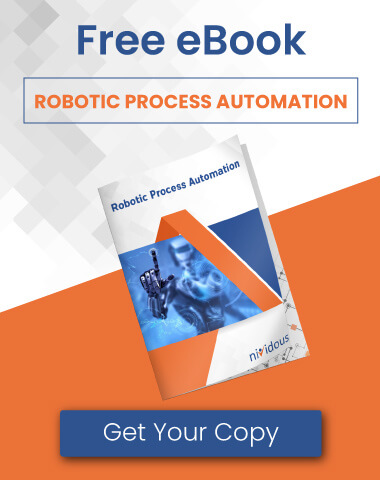Robotic process automation, or RPA, is a software that has the ability to launch and operate other applications using robots, also called bots. Professionals across many industries have implemented RPA to automate both front- and back-office tasks. Some are manually executed (attended) while others work independently of human interaction (unattended). The primary purpose of RPA is to help businesses supercharge mundane, repetitive, and rule-based processes so employees can focus on higher-value tasks, such as serving customers and generating revenue.
While there are key differences between attended vs. unattended RPA bots, it’s important to note that both are helpers intended to optimize, support, simulate, and sometimes replace human work.
Are you struggling to manage an inefficient process?
Tell us what it is, and we’ll tell you if our Nividous intelligent automation platform can help!
Attended vs. Unattended RPA: The Key Difference
The key difference between attended vs. unattended bots is this: Attended bots must be activated by employees while unattended bots operate on a preset schedule free of human interaction.
Here’s some more detail to help explain:
Attended robotic process automation works alongside employees directly on their computer, similar to a virtual assistant. It optimizes their repetitive tasks, increases their productivity, and improves their quality of work by providing real-time guidance and automated activities. However, the attended bot must complete each task before an employee can move on to any other activity.
An example of attended RPA is when a customer service specialist activates a bot to execute an address change request in a matter of seconds instead of making the updates manually, which could involve a number of steps and clicks.
Unattended RPA bots execute batch operations (a complex set of tasks) that do not require human interaction. They typically operate on a preset schedule or as triggered by logic programming (e.g., a predetermined set of facts and rules).
For example, an unattended bot can follow a predetermined workflow to identify vendor invoices sent via email, read those particular emails, store the attached invoices on the local system and prepare them for payment. Unattended bots can carry out this type of work around the clock.
The Benefits Of Attended RPA
Many corporate employees spend a considerable amount of time switching between programs and platforms while also trying to engage with their internal or external customers. Attended automation is useful in these situations because they:
- Boost efficiency. Attended bots eliminate the real-time burden of data entry and retrieval. This allows your employees to fully focus on customers’ needs. The end result is higher efficiency for your team and increased customer satisfaction for your business.
- Require minimal setup. Deployment is quick and relatively simple because attended bots resolve particular, concrete problems that are designed to be task-specific. This allows you and your team to stay focused on what matters most.
- Achieve rapid ROI. Implementation is straightforward and the resulting time savings (e.g., soft cost savings) will help your business realize a return on investment within the first year.
The Benefits Of Unattended RPA
Unattended automation gives companies the ability to scale quickly as they experience fluctuations in customer demand, which means they don’t have to hire more employees to do things like manage inventory, process orders, or handle payments. Here are a few benefits of unattended automation:
- It reduces operating costs. Unattended bots help increase productivity, eliminate errors, improve compliance, and eliminate manual repetitive tasks, which leads to significant cost savings for your business.
- It can be accessed remotely. Perhaps one of the most exciting benefits of unattended automation is that it can run on workstations, private servers, or in the cloud. This means administrators can access the interface remotely to view, analyze, and deploy scheduling, reporting, auditing, monitoring, and modifications in real-time.
- It has limitless capacity. Unattended bots can be very useful for industry sectors that require 24/7 operations and uninterrupted, accurate work such as healthcare, hospitality, and telecommunications.
- It promotes more seamless task execution. Though you can “set and forget” unattended bots, administrators have full oversight over their activities (e.g., reporting, auditing, monitoring) in real-time. This means employees can focus on higher-value tasks while batch processes (e.g., finalizing daily credit card transactions) run overnight or in the background. Employees can simultaneously check the progress as needed.
What type of RPA is right for my business?
If you’re wondering which type of RPA is right for your business, we’ve got great news—you don’t need to choose. Both attended and unattended bots play an important role in an RPA deployment. In fact, when deployed simultaneously in an integrated platform like the one provided by Nividous, they can streamline all your key processes (even those that necessarily include humans) so you can work more productively and achieve more.
If you want to unlock the true potential of your workforce, we invite you to learn more about our Nividous Quick Start model, specifically designed to expedite robotic process automation for your business. Working closely with our experienced professional services consultants, you’ll typically have a solution to deploy within three to four weeks.
If you’d like to see how our Nividous intelligent automation platform works, schedule a live demo today. We look forward to helping your business thrive!
Are your intelligent automation investments delivering real ROI?
Watch our on-demand webinar to discover strategies and frameworks for measuring genuine intelligent automation ROI that go beyond hard numbers.





